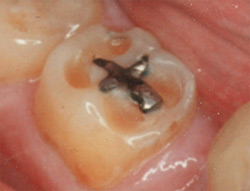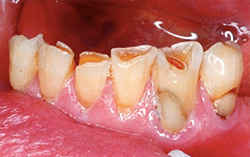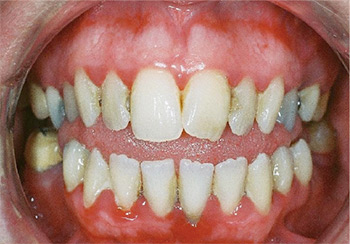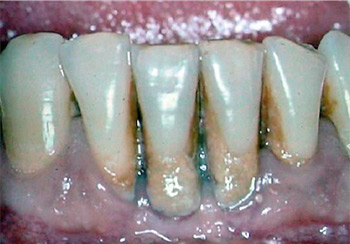Causes of Breakdown of Teeth
Teeth are broken down in numerous ways. The most common are from decay, trauma, and tooth wear.
Decay is caused by bacteria on the tooth surface slowly converting sugar into acid which eats at the hard enamel of the tooth, and then the softer dentine underneath. This is why to avoid tooth decay, you must:
- limit how the bacteria work by reducing the amount of sugar that can be turned to acid
- reduce the effectiveness of the bacteria by disrupting the ‘film’ that they live in through good hygiene
- reduce the intake of acidic drinks such as juice, soft drinks etc
Tooth wear is caused in a few different ways.
 Erosion is where acid in food causes the enamel to wear away, leaving the softer dentine exposed which causes a saucer shaped effect on the tooth surface.
Erosion is where acid in food causes the enamel to wear away, leaving the softer dentine exposed which causes a saucer shaped effect on the tooth surface.
Abrasion is caused by an external force, such as excessive toothbrushing which typically wears away the tooth close to the gum level.
 Attrition is where the teeth wear away through grinding against themselves, typically done subconsciously. This can be prevented by wearing a bite guard.
Attrition is where the teeth wear away through grinding against themselves, typically done subconsciously. This can be prevented by wearing a bite guard.
Abfraction is when the force of chewing causes the tooth to flex in different directions, leading to minute fracture in the enamel, again, close to the gum level.
Dental Pain
Essentially, there are 2 types of dental pain, reversible and irreversible.
When decay or wear is present in a tooth, it can stimulate nerve fibres on the edge of the pulp causing a short, sharp pain. these fibres are also stimulated by cracks and sweet things. In these cases, a filling is all that may be required to ease the symptoms.
If the decay is left untreated, then the nerve fibres deeper in the pulp can be stimulated. These fibres tend to have a higher threshold, so the pain is more intense and lasts longer. This kind of pain tends to be intensified by heat, relieved by cold and will localise over time.. Treatment for this kind of pain usually involves removal of the nerve fibres, either through Root canal fillings, or extraction.
Gum Disease (Gingivitis/Periodontitis)
Gum disease is largely a very preventable disease. It is caused by bacteria collecting in the area between the teeth and the gums as plaque, causing inflammation which in turn breaks the tight attachment between the tooth and the gum. This causes the tooth to become loose over time and may be eventually lost.


Some people can be susceptible to gum disease, including smokers, diabetics and people on certain medication, so it requires more thorough cleaning to keep any potential disease under control.
 It can be prevented by a good oral hygiene routine, including thorough brushing and flossing to break down the layers of plaque bacteria. Avoiding factors such as smoking and poor diet, along with regular trips to the dentist will also help to minimise the risk. A healthy gum line will be bright pink in colour, and will not bleed during brushing or flossing.
It can be prevented by a good oral hygiene routine, including thorough brushing and flossing to break down the layers of plaque bacteria. Avoiding factors such as smoking and poor diet, along with regular trips to the dentist will also help to minimise the risk. A healthy gum line will be bright pink in colour, and will not bleed during brushing or flossing.
Oral Cancer
According to the Irish Dental Health foundation, over 400 cases of oral cancer are discovered each year in Ireland. If the cancer is detected early, there is a very good survival rate.
The symptoms of mouth, head and neck cancer can include:
- A sore or ulcer in the mouth that does not heal
- White or red patches inside the mouth
- A lump in the mouth or neck
- Thickening or hardening of the cheek or tongue
- Difficulty chewing, swallowing or moving the tongue
- Unexplained loose teeth.
Risk factors for oral cancer include smoking, chewing tobacco, drinking alcohol, HPV virus and over exposure to the sun.
75% of oral cancers could be prevented by reducing alcohol consumption and elimination of smoking.



